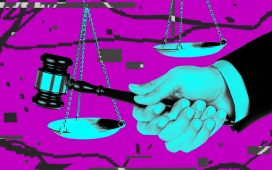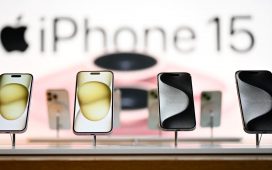With help from Cristiano Lima and Doug Palmer
Editor’s Note: Morning Tech is a free version of POLITICO Pro Technology’s morning newsletter, which is delivered to our subscribers each morning at 6 a.m. The POLITICO Pro platform combines the news you need with tools you can use to take action on the day’s biggest stories. Act on the news with POLITICO Pro.
— Electoral disinformation picks up steam: Baseless narratives delegitimizing the presidential election are consolidating across social media, gaining viral (and potentially dangerous) momentum in the limbo before a winner is called.
— Trump puts Twitter to the test: Nonpartisan voting rights and legal groups are throwing their weight behind Democratic lawmakers’ demands for Twitter CEO Jack Dorsey to ban President Donald Trump from the platform for spreading election disinformation.
— Meme madness: Nevada has become a center of gravity for meme-makers poking fun at the state’s ballot-counting process, much to the state attorney general’s chagrin.
HARDLY FEELS LIKE THE WEEKEND, BUT IT’S FRIDAY. WELCOME TO MORNING TECH! I’m your (very sleepy) host, Alexandra Levine. Just keep counting, just keep counting …
Got a news tip? Write to Alexandra at [email protected], or follow along @Ali_Lev and @alexandra.levine. An event for our calendar? Send details to [email protected]. Anything else? Full team info below. And don’t forget: Add @MorningTech and @PoliticoPro on Twitter.
MISINFO MONITOR: THE TALE OF TWO VIRAL SOCIAL MEDIA CONSPIRACIES — Our internet airwaves continue to be flooded with mis- and disinformation. But at week’s end, experts say the static is now beginning to clear, making way for two dominant, domestic-driven viral conspiracies around the election — #SharpieGate and #StopTheSteal — to grow louder and more threatening.
— Rewind: What’s #SharpieGate? “The innocuous Sharpie has become the 2020 presidential election’s most befuddling flashpoint, and, according to President Donald Trump’s most fervent supporters, the crux of a Democratic plot to steal the election,” my colleagues Tina Nguyen and Mark Scott report. It stemmed from baseless claims that some Arizona ballots that had been filled out using Sharpie markers were not being counted — a narrative that, with the help of the internet and political influencers, swiftly picked up steam and went viral. “Only 15 hours later, it became the basis for Trump’s most high-profile allies to call Arizona’s results into doubt.” (Arizona Attorney General Mark Brnovich said Thursday night on Twitter that, following conversations with officials in Maricopa County, “we are now confident that the use of Sharpie markers did not result in disenfranchisement for Arizona voters.”)
— And #StopTheSteal? The hashtag has been used to help mobilize protesters questioning the legitimacy of the election results. Facebook on Thursday banned a major Facebook group (with more than 350,000 members) that had coalesced around the cause and featured some material calling for violence. That action, in turn, gave the stolen election narrative even more momentum, according to Camille Francois, research and analysis director at Graphika. “The movement and the organizer respond to this enforcement action, call it censorship, and really use it to continue the mobilization around their cause,” she said during an Election Integrity Partnership briefing Thursday evening, adding that the Facebook group ban has already prompted some movement to smaller platforms, including Discord and Parler. (A “stolen election” website has also been set up to support organizing efforts.)
— Baseless, but will it stick? These election fraud conspiracies are already spurring real-world action — in the form of threats to officials and protests demanding vote recounts, for example — and the partnership researchers warned that calling the presidential race (whenever that may be) is unlikely to be the end. “We expect now, at this point, that these narratives are going to survive the election and will last for quite a long period of time, perhaps becoming either consolidated into existing conspiracy frameworks such as QAnon, or becoming the basis of completely new conspiracies,” former Facebook security chief Alex Stamos, who is now director of the Stanford Internet Observatory, said during the briefing Thursday evening. “Even after, say, inauguration — there will be a significant portion of people who believe the election was stolen and who are going to use these narratives as the basis of that belief, and then will build upon it.” Watch out for these narratives to evolve in the coming days with the developing legal challenges.
PLUS: MORE FACEBOOK CHANGES INBOUND — In response to the proliferation of online misinformation as ballot counting continues, the social network revealed Thursday that it would implement incremental changes to limit the reach of such content and debunked claims about the voting process. That material, and live videos about the election, will be demoted across Facebook and Facebook-owned Instagram, the company said.
GROWING CHORUS OF CRIES FOR TWITTER TO BAN THE PRESIDENT — Nonpartisan voting rights and legal groups are throwing their weight behind demands for Jack Dorsey to ban Trump from the platform for spreading election disinformation. The good governance group Common Cause and the Lawyers’ Committee for Civil Rights Under Law wrote to the CEO on Thursday urging that @realDonaldTrump be suspended temporarily for amplifying false claims about voting and repeatedly violating the site’s Civic Integrity Policy. Twitter’s decision to label and limit the reach of such posts does not go far enough, the groups argue. (Twitter has stressed that its approach has been effective and in line with its established policies.)
— “We understand the difficult situation Twitter finds itself in as it works to balance the newsworthiness of a public figure’s use of the platform, and the potential threats to democracy and public safety from its unfettered use,” the groups wrote. “We believe that, particularly in the next 24-48 hours, the balance must be weighted towards the free, fair, and transparent operation of our civic processes.” The company confirmed receipt of the letter and intends to respond, a spokesperson told MT.
— Further reading, via Bloomberg: “Trump’s Special Treatment on Twitter Would End With Biden Win.”
MORNING TECH MEME CORNER, BECAUSE IT’S BEEN A WEEK — Mis- and disinformation experts have warned about the dangers of memes, but that hasn’t stopped social media users from making light of the dumpster fire that has been election week. Case in point: Nevada has become inspiration for ballot-counting jokes and memes across Instagram, Twitter and TikTok.
— “Waiting for Nevada is like waiting for an edible to kick in,” said one Instagram post. “It’s going to be really good or really bad.” There’s Nevada as Prince lounging on the couch in silk pajamas, on what is probably a Saturday night, in no apparent rush, because — priorities. There’s Nevada as 90s sensation Brian McKnight, trying to count past five but, each time, starting “back at one” (as the famous love song goes). There’s Nevada as a rookie baseball player struggling, at a snail’s pace, to get from third base to home plate. There’s Nevada swearing at us, laughing at us and blowing us kisses everywhere we go. And there’s Nevada as the incomplete party looking bewildered when it can’t be seated at the restaurant until everyone has arrived.
— No one puts Nevada in a corner: Apparently, a meme joking that the Zootopia sloth is counting Nevada’s ballots took it one step too far, prompting state Attorney General Aaron Ford to respond that “we’re doing the best we can” and “it’s going to take some time.”
AND IN RARE NON-ELECTION NEWS: WTO TO WEIGH INFO TECH AGREEMENT — Shall we skip the chaos and fast-forward to next spring? The World Trade Organization is holding a workshop then to discuss whether to expand the Information Technology Agreement for the second time. The original pact, which eliminated duties on a long list of technology goods, was concluded in 1996, but it was expanded to eliminate tariffs on many more items in 2015. Since then, there has been continued development of information and communications technology products. Next year is the 25th anniversary of the original pact.
Former DHS chief of staff under Trump Miles Taylor, who was on leave from Google when he revealed last week he had written the damning, anonymous New York Times op-ed about the Trump administration, has left Google, per BuzzFeed News. … Ashkhen Kazaryan, director of civil liberties at the libertarian-leaning think tank TechFreedom, is joining Facebook on Monday as a policy manager for content regulation. … Former Homeland Security Secretary Janet Napolitano, who was previously governor of Arizona, has joined Zoom’s board of directors. … The 30-day application window for the FCC’s Connected Care Pilot Program opens today at noon.
YouTube’s free pass?: “Millions of people since the election have watched and shared videos featuring debunked or unproven allegations,” WaPo reports. “Why doesn’t YouTube get more attention for its lax rules around viral lies?”
Pushing Prop 22: Uber CEO Dara Khosrowshahi said Thursday that Proposition 22, the California ballot measure passed this week that exempts Uber and other gig companies from the state’s AB 5 labor law, should create a template for regulating the gig economy more broadly, POLITICO’s Jeremy B. White reports.
Opinion: What does Prop. 22 mean for the future of organizing and tech workforce activism? Meredith Whittaker, co-founder of the AI Now Institute, and Veena Dubal, law professor at the University of California, Hastings, unpack that in OneZero, Medium’s tech and science publication.
Tips, comments, suggestions? Send them along via email to our team: Bob King ([email protected], @bkingdc), Heidi Vogt ([email protected], @HeidiVogt), Nancy Scola ([email protected], @nancyscola), Steven Overly ([email protected], @stevenoverly), John Hendel ([email protected], @JohnHendel), Cristiano Lima ([email protected], @viaCristiano), Alexandra S. Levine ([email protected], @Ali_Lev), and Leah Nylen ([email protected], @leah_nylen).
TTYL.









